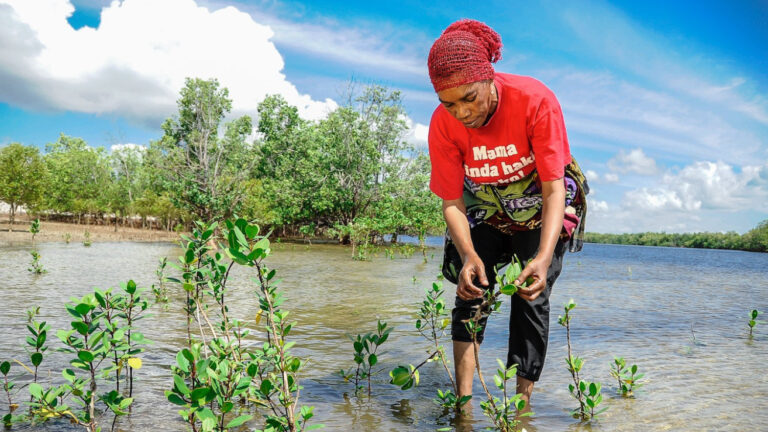By The North Journals Staff
As climate change intensifies, a vital solution quietly thrives along Africa’s coasts—one that could sequester millions of tons of carbon, safeguard vulnerable communities, and revitalize marine biodiversity. Known as blue carbon ecosystems—mangroves, seagrasses, and tidal marshes—these coastal habitats are proving to be far more than picturesque shorelines. They’re rapidly emerging as essential bulwarks in the global fight against climate change.
“Though they cover just 2% of the ocean’s surface, these ecosystems store up to five times more carbon per hectare than tropical rainforests,” notes Trésor Daniel Mefire in Blue Carbon Imperative: Protecting Africa’s Coastal Ecosystems to Cool the Planet. “Yet, nearly half of them have been lost since the 19th century.”
According to Mefire, mangroves alone can lock away 1,000 tons of CO₂ per hectare—roughly equal to the yearly emissions of 2,500 gasoline-powered cars. But their destruction—driven by logging, shrimp farming, and urban sprawl—releases vast amounts of stored carbon, contributing nearly 1 billion tons of CO₂ annually to the atmosphere, comparable to the emissions of Germany.
Coastal Africa: Rich in Carbon, Ripe with Risk
Africa’s 30,000-kilometre coastline harbors some of the richest blue carbon ecosystems on Earth. The mangroves of the Congo Basin store more than 2 billion tons of CO₂, while Kenya’s Gazi Bay seagrass beds sequester carbon 35 times faster than terrestrial forests. Despite their climate value, these habitats are under siege.
“In Nigeria, 40% of mangroves have been lost to oil pollution and unregulated logging. In Madagascar, seagrass meadows shrink by 5% annually,” Mefire warns. The economic costs are staggering—Mozambique’s mangrove losses alone have increased annual flood damages by $80 million.
Cameroon at a Crossroads
Cameroon’s own blue carbon treasure lies in its 200,000 hectares of Atlantic mangroves. The Wouri Estuary alone stores 25 million tons of CO₂. Yet, unsustainable fuelwood harvesting and aquaculture have already erased 20% of these mangroves since 2000.
Despite the challenges, rays of hope shine through. Local programs like REDD+ have restored 5,000 hectares and trained coastal communities in sustainable fishing and beekeeping. In Douala, women’s cooperatives are cultivating oysters among mangrove roots—generating income while enhancing carbon sinks. Even traditional knowledge is being put to work: In the Niger Delta, Ogoni communities are using mangrove roots to filter oil-polluted water, fusing indigenous wisdom with bioremediation science.
“These examples show that conservation isn’t just ecological—it’s economic and cultural,” Mefire asserts.
Gaps in Policy, Science, and Funding
Still, the path forward remains obstructed by significant gaps in data, regulation, and finance. Only 10 African nations have mapped their blue carbon stocks. And of the many countries that signed onto the Global Ocean Alliance’s 30×30 pledge, just 12% have enforceable blue carbon policies. Cameroon’s long-delayed Blue Economy Law, stalled since 2021, is emblematic of the broader policy paralysis.
On the funding front, carbon markets offer transformative potential. The Global Carbon Council estimates that African blue carbon credits could unlock up to $3 billion annually. Senegal’s Delta Blue Carbon project, backed by the Green Climate Fund, exemplifies how carbon finance can fund restoration and create jobs.
A Climate Imperative and Opportunity
Blue carbon ecosystems may be Africa’s most underappreciated natural climate solution. “Protecting Cameroon’s mangroves alone could avoid 10 million tons of CO₂ emissions by 2030 and secure livelihoods for over half a million people,” Mefire emphasizes.
To do so, the continent needs global partnerships, science-backed policy, and sustained community engagement. As Mefire concludes: “By prioritizing blue carbon, Africa can turn its coasts into a frontline of climate action, where ecology and economy thrive as one.”
The time to act is now.
Source: Trésor Daniel Mefire, Blue Carbon Imperative: Protecting Africa’s Coastal Ecosystems to Cool the Planet (2023). PDF Blue Carbon Imperative
Image Credit: WWF Kenya
